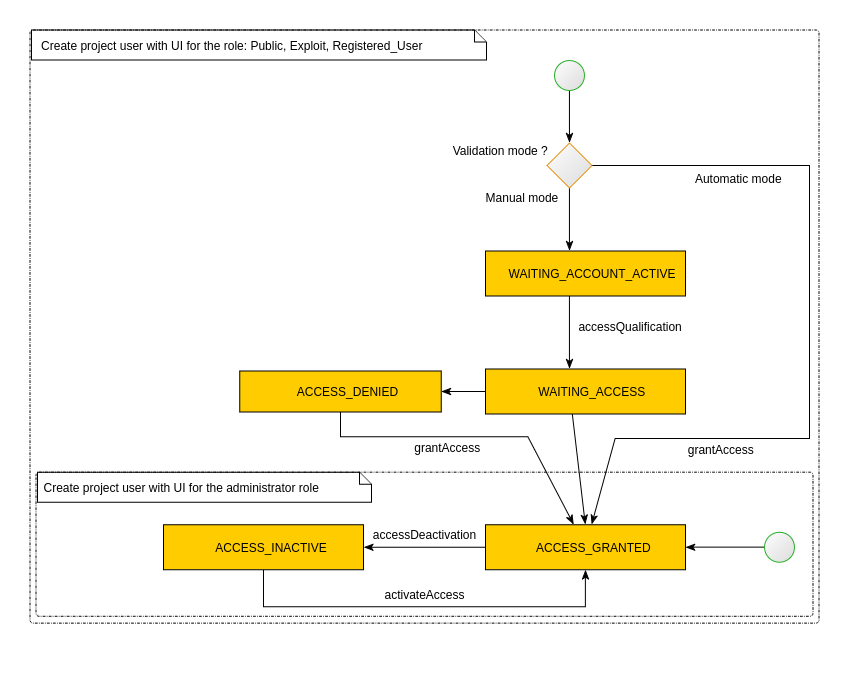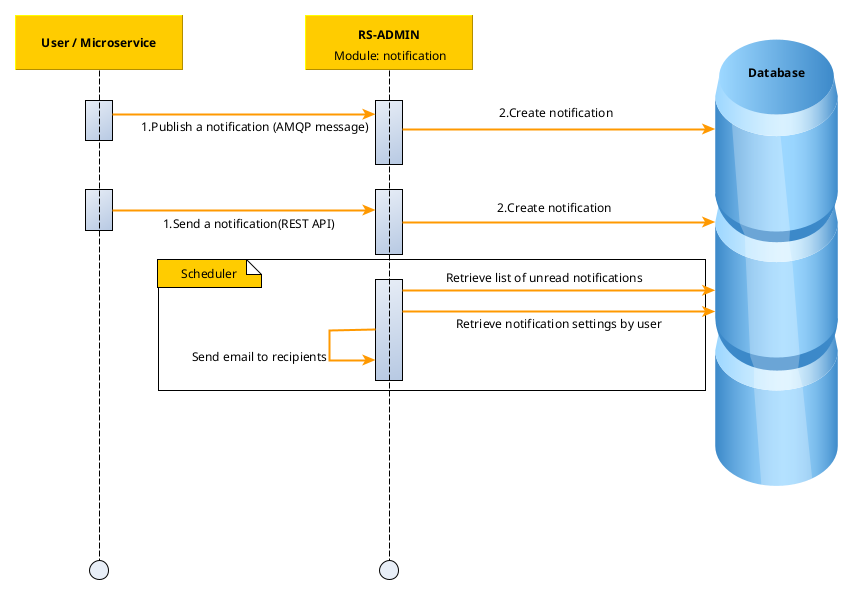How it works
The rs-admin is designed to manage specific responsibilities for each project within the Regards architecture.
This microservice consolidates a range of functionalities, organized into different modules.
Module : accessrights
This module is designed to manage access rights for Regards users. It handles the distribution of licenses across projects and project users, controlling the ability to download order files.
A project user is a user that must be associated with only one project in Regards. Each project user is linked to a unique account. The same account can have different project users for each project, allowing one account to be connected to multiple projects. The relationship between a project user and an account is established via the user’s unique email address, which also serves as the login for the Regards UI.
The account is stored in the database within the rs-admin-instance as a single instance. The project user, however, is
stored separately in the database for each project or tenant in Regards.
The following state diagram outlines the various states a project user goes through during the registration process in Regards:

A project user has a single role in a project. When the microservice is started, the following list of roles is loaded from the database and made available for the creation of new project users :
- PUBLIC role : not connected user for a project. Users of this role have read-only access.
- INSTANCE_ADMIN role : administrator for multitenant or several projects. Users of this special role can override any restrictions on access to features and data for all projects.
- PROJECT_ADMIN role : main administrator for a project. Users of this special role can override any restrictions on access to features and data.
- ADMIN role : administrator for a project. Users of this role have access to all project administration functions.
- EXPLOIT role : exploit (connected user) for a project. Users of this role are granted access to a limited number of administrative functions related to project operation.
- REGISTERED_USER role : connected user for a project. Users of this role can consult, download and order data.
A role is always inherited from a parent role. Each role contains a list of access rights associated with specific http endpoints (see the menu item in each microservice: API Guides->Rest->All endpoints (OpenAPI)), a role inherits all access rights from a parent role. Regards allows you to create new roles that are inherited from a parent role.
A project user has one or more access groups. An access group is used to determine a user's rights to view datasets, so that they can subsequently carry out commands.
This is the Regards administrator responsibility to determines the access rights of each user.
Module : notification
The purpose of this module is to send notifications to inform users connected to Regards about the progress of tasks performed by microservices. Notifications can be sent to a specific user or to all users assigned to a particular role.
A user interface allows notifications to be viewed using various criteria. A notification consists of the following parameters:
- created date,
- message,
- sender : name of microservice (rs-dam, rs-fem, rs-lta-manager ...)
- status (read/unread),
- title,
- type (Error, Warning, Info, Fatal)
The notification can be created by AMQP message or by REST API.
When a notification has been created and stored in the database, the microservice sends emails to the following recipients. Each user can configure the frequency at which emails are sent. This setting is located in each user's profile. The list of available frequencies is as follows : custom(day, hour), daily, weekly, monthly.

In the above diagram, each frequency has its own scheduler.
Module : session
The purpose of this module is to centralize information on the monitoring of data additions in Regards, making it easier for users to supervise various processes:
- Data acquisition (available actions: view acquisition chains, view requests in error, restart errors) errors)
- Data referencing (possible action: view referenced products, view errors, restart errors)
- Data archiving and storage (possible action: relaunch errors)
- Data notification
Sessions enable monitoring of the various steps in data processing within Regards, from the data provider acquisition to the indexation in catalog. A session is defined by a session name and a session source. This information is provided by each microservice that notifies the "Session" module to update the session's state. A source can contain one or more sessions, but each session belongs to only one source. For each session, the user can track the number of products referenced and the number of products distributed Sources and their respective sessions are displayed in the Regards administrator UI dashboard.
Each microservice (rs-dam, rs-dataprovider, rs-fem, rs-storage, rs-worker-manager, rs-ingest) sends an
AMQP message to update session information asynchronously.
Each AMQP message is typed according to the process:
- ACQUISITION : for steps originating from
rs-dataproviderandrs-worker-manager - REFERENCING : for steps originating from
rs-ingestandrs-fem - STORAGE : for steps originating from
rs-storage - DISSEMINATION : for steps originating from
rs-dam